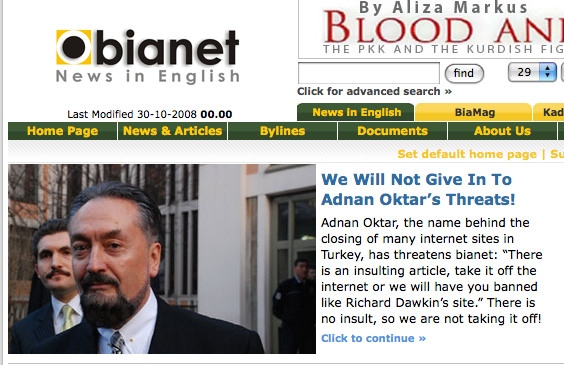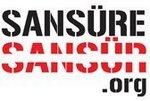[Blog entry by Yaman Akdeniz] Interesting story developing in Turkey right now. If you would recall Adnan Oktar (Adnan Hodja) is the Turkish creationist who is behind almost 61 blocking orders issued by the courts in Turkey to popular websites including wordpress.com, richarddawkins.net, egitimsen.org.tr, groups.google and gazetevatan.com.

As you will read below, this time he threatened to take legal action against Bianet, an independent progressive media site which published an article (in Turkish) that was drafted by myself and Kerem Altiparmak. We basically argued in the article that with regards to private law matters such as claims for defamation, and privacy invasions, the notice & takedown, and right to reply provisions of article 9 of Law No. 5651 should be followed. We explained in the article that unlike article 8 of Law No. 5651 (which is used for blocking access to websites in Turkey), article 9 does not contain “blocking” measures. The Turkish Parliament decided to provide the “blocking measures” with regards to the catalogue crimes listed in article 8 only. Therefore, since the Law No. 5651 came into force, and based on the lex specialis derogat generali doctrine, it is unlawful for the courts, or public prosecutors which are empowered to decide on claims with regards to private law matters to issue “blocking orders” or precautionary injunctions. Currently, the specific governing law is Law No. 5651 and article 9 provisions are not overridden by laws which govern general matters within the Turkish law.
Furthermore, article 8 and article 9 provisions are clearly distinct from each other. While article 8 regulates serious content crimes committed on websites located both in and outside the Turkish jurisdiction, and provides blocking measures, article 9 regulates private law disputes between individuals and involves notice & takedown and right to reply provisions. The exclusion of blocking measures from article 9 shows that the main concern of the legislators was the tackling of the serious crimes listed in article 8 and blocking is not provided as a preventative measure for the less serious private law disputes.
Going back to the legal threat, obviously we have not “defamed” anyone including Oktar in the article. His lawyers are not happy about the views put forward including the criticism of the courts who have been issuing the blocking orders. They therefore thought it is best to get rid of our “views” completely. However, Bianet, which should be applauded for taking the risk of being blocked and taken to the court in Turkey stands by the decision to publish the article at http://www.bianet.org/bianet/kategori/bianet/110319/internete-karsi-adnan-hoca-tum-kapatmalar-hukuka-aykiri
The threats are not substantiated and will not lead into the article being removed from Bianet’s website nor from privacy.cyber-rights.org.tr. Currently thanks to the anti-censorship movement SansureSansur’s the article is being spread on a considerable number of Turkish blogs like a virus!

A detailed assessment of the Turkish approaches to Internet content regulation will be provided in an 80 page long report entitled Restricted Access: A Critical Assessment of Internet Content Regulation and Censorship in Turkey written by Dr. Yaman Akdeniz and Dr. Kerem Altiparmak. This bi-lingual (English/Turkish) report will be published during November 2008 and will be made available as a PDF file through cyberlaw.org.uk and cyber-rights.org.tr pages.